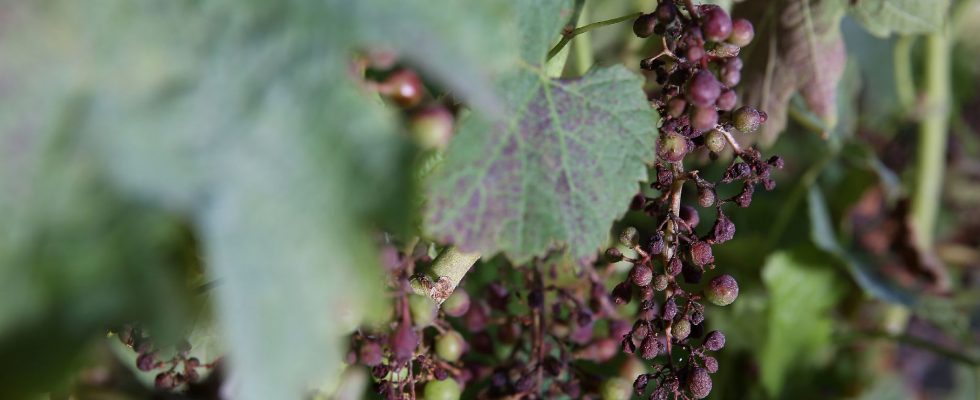“It’s been two months that we believe in Martinique!” Mikaël Cousinet’s vineyard is however far from Fort-de-France, but in Gironde, more than 6,500 kilometers from the Caribbean. For many weeks now, he has defined the climate of his department as “semi-tropical”, with “temperatures exceeding thirty degrees” accompanied by “thunderstorms”, “very frequent rains” and “remanent humidity “.
It may seem contradictory for a farmer to complain about too much rain. Extreme drought remains the main threat for farmers, with 2023 already set to beat all records for temperature and aridity. But in the Southwest, the situation is slightly different. Spring and the beginning of summer were marked by very heavy rainfall and major stormy episodes. An almost constant humidity that brought with it a parasite, terror of vineyards and winegrowers: mildew.
“Absolutely destructive”
This brown algae, which has become a parasite over time, is nothing new. “Mildew is preserved in the soil and must find climatic conditions that favor its expression. Very humid and very hot days are very favorable to the disease”, explains François Delmotte, director of research at the National Institute of Agronomic Research. (Inrae) and specialized in vine downy mildew. Exactly what the South West has experienced in recent weeks.
Under these conditions, the mildew can then project itself from the soil to the leaves, then contaminate all the green parts of the plant. “If he falls on clusters when we are at the beginning of flower formation, it can be absolutely destructive, continues the Bordeaux researcher. If you do not treat your plot upstream and mildew has developed, there is no way to cure it.”
The particularly vulnerable vine
If mildew can affect other crops, such as potatoes or tomatoes, “vines remain particularly sensitive to mildew”, explains François Delmotte. Above all, in the South-West, which is very humid, it finds a very favorable climate there to prosper, more than in other regions where drought has hit almost discontinuously since the beginning of 2023.
More than 90% of the vineyards of Gironde would thus be affected, according to the first estimates of the chamber of agriculture of the department, with for some the harvest of the year of which there is almost nothing left to save. “Usually, we have very hot and humid one-week periods, which then alternate with dry periods, notes Laurent Bernos, director of the winegrower’s division at the Gironde chamber of agriculture. This year, we n never had that stoppage. We had dew every morning for two to three weeks!”
Mikaël Cousinet will remember the weekend of July 8 and 9 for a long time. “In two days, we lost almost half of the harvest. It’s a year’s work. My father has been a winemaker since 1976 and he had never seen this. It was amazing”. He already estimates the “mildew impact” at nearly 50,000 euros for his operation. “Half of my turnover”, notes the winegrower, annoyed.
One more climatic hazard
For winegrowers, it is difficult not to see in this new episode one more climatic hazard that is hitting them hard. “We had to endure episodes of late frost. We had very heavy hail. Last year, drought. And there an attack of mildew that we had never experienced in our life. Psychologically, it’s very difficult. The winegrowers are in great disarray”, observes Laurent Bernos.
One more problem for a sector already in tension. In addition to the various climatic episodes, the progressive deconsumption of wine in France for several years has also put the sector in difficulty. “It’s yet another blow, some farms will not have any money coming in, worries Laurent Bernos. This puts the future of certain companies in the future.”
The Minister of Agriculture on the move
However, treating mildew has a price, and there is the vicious circle. “Many winegrowers no longer have cash, and can no longer afford to buy treatments for their vines”, notes winegrower Mikaël Cousinet. In this mildew crisis in Gironde, the nearly 6,000 hectares of vines abandoned and left fallow by certain winegrowers are particularly singled out as an aggravating factor in the spread of the parasite. Enough to force the government to launch for this summer an emergency sanitary uprooting plan for nearly 10% of the 110,000 hectares of vines in Gironde, a first in France.
Requested in recent weeks by local elected officials, the Minister of Agriculture Marc Fesneau will thus visit a Gironde winery this Wednesday, July 19. With in front of him, operators in distress. “We are a little resigned, it’s not easy, recognizes Mikaël Cousinet. When you meet people who thought they had done everything well, who say they lost everything, it’s very hard to manage.”
